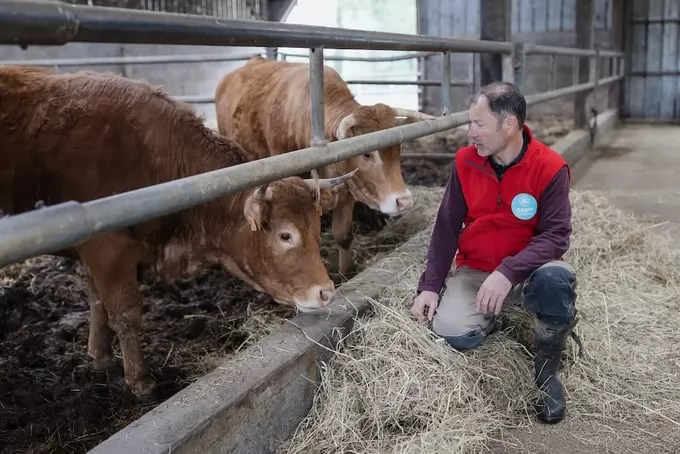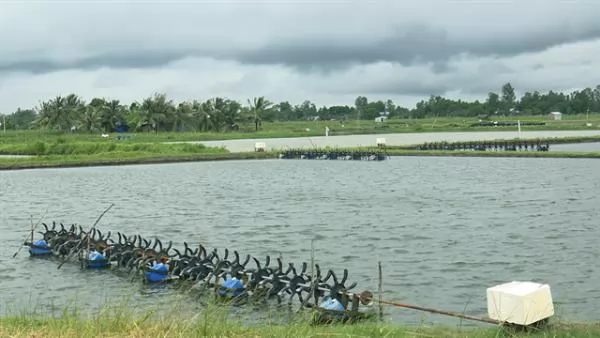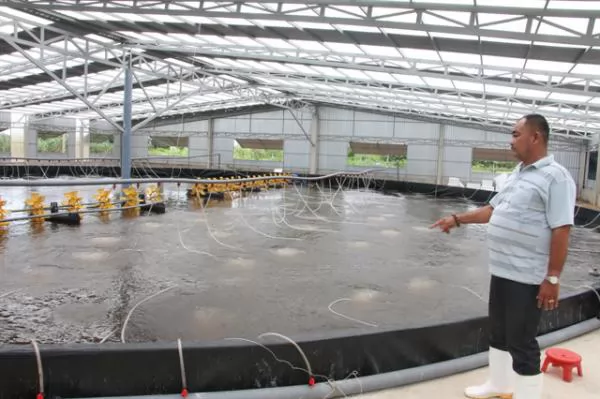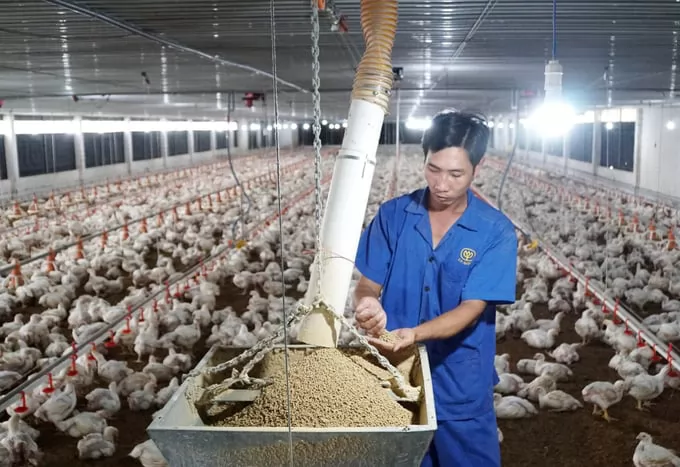Europe's farmers are in revolt and the far right is trying to make hay

Fabien Tigeot, who heads a regional federation of organic farmers in Brittany, keeps 50 cows on his farm in La Ville Aly, France. Photo: Laurence Geai/MYOP for The Washington Post
(VAN) Farmers are mad about high costs and low prices, about the prospect of free trade deals, about the constraints of climate regulations, about what they say is a failure of political elites ...
The farmers standing with their arms crossed outside a sheep barn in rural Brittany were absolutely furious, completely en colère. For a visiting centrist politician, that made for an earful. For Europe’s far right, it has provided an opening.
In recent months, angry agricultural workers have rolled their tractors into Paris and other cities across Europe, blocking roads, spraying manure and setting things on fire. Farmers are mad about high costs and low prices, about the prospect of free trade deals, about the constraints of climate regulations, about what they say is a failure of political elites to understand what it means to grow wheat or raise sheep.
Their revolt is reshaping European policy — officials who previously promised to put the environment first and lead the world in a green transition have scrambled to walk back some of their own rules.
And in a year of key elections in both Europe and the United States, the farmer uprising may foretell a sharp right shift.
The European far right is skillfully seizing the moment, promising an agricultural overhaul and a chance to stick it to the city slickers. By inserting themselves into the farm fight, far-right figures have the potential to broaden their appeal. They can also continue to rail against elites and make the case for nationalism, as symbolized by salt-of-the-earth farmers.
French far-right icon Marine Le Pen and her party have seemed particularly eager to channel agricultural outrage. “They have co-opted the movement as their own,” said Mujtaba Rahman, managing director for Europe at the Eurasia Group, a political risk consulting firm. “This is a cynical and opportunistic move by the far-right, but it is proving effective.”
In the Netherlands, fury over a proposal to meet E.U. nitrogen pollution targets by reducing livestock herds helped propel a farmers’ party into a surprise first-place finish in provincial elections last year and is among the reasons the party has backed far-right nationalist Geert Wilders in coalition negotiations.
In Germany, when planned subsidy cuts in the agriculture sector brought farmers into the streets, the far-right Alternative for Germany (AfD) overlooked that its party platform called for the abolition of subsidies. AfD politicians joined the farmer protests in the hope of bolstering their position as the second-strongest party in German polls ahead of key regional elections in the fall.
Early polls suggest the far right will also make a strong showing in the European Parliament elections in June. While farmer angst is just one of many factors driving that vote, far-right politicians appear to be trying to capitalize on it.
Hungarian Prime Minister Viktor Orban, in Brussels for a European leaders’ summit, told farmers protesting there: “It’s a European mistake that the voice of the people is not taken seriously. … We have to find new leaders who really represent the people.” For his audience back in Central Europe, where the concern is about the European Union allowing cheap Ukrainian grain to enter its market, his Fidesz party released an animated video accusing Brussels of “destroying the livelihood of European farmers.”
What’s happening in France helps explain how Europe got here — and what could come next.
There is not a singular reason why years of simmering unrest have exploded into massive protests, which for one particularly dramatic period in January saw tractors block the major arteries in and out of Paris. In France, there are as many irritants as there are agricultural unions, associations and interest groups — that is to say, a lot.
The Brittany farmers had plenty to vent about when Marie-Pierre Vedrenne, a French member of the European Parliament from President Emmanuel Macron’s political family, stopped by the sheep farm on a Monday morning in March to share a simple meal at a long barn table and listen to complaints.
The farmers talked about how, even with subsidies, it was hard to make a living, because prices for their produce were not keeping pace with costs. They pressed Vedrenne about a prospective free trade deal, arguing that they should not have to compete with produce from less-regulated markets abroad.
“We’re under the impression that we’re being sacrificed, that we’re the adjustment variable in these international agreements,” said farmer Cédric Henry.
David Rondin, who runs the sheep farm, lamented that French schools were turning children against meat.
Vedrenne told them that she is fighting to negotiate better trade terms and assured them that she, too, wants to see French meat and milk in French schools.
Many farmers also feel burdened by E.U. rules outlining how they should rotate their crops or till their land. Clueless bureaucrats from Brussels are telling them when and how they can trim their hedgerows, said Bruno Gauthier, the director of a regional association of farming unions.
French and other European leaders have sought to appease the farmers — and neutralize far-right advantages.
Gabriel Attal was dispatched to deal with farmers just days after his January appointment as France’s youngest prime minister. He has since promised tens of millions of euros in aid and tax breaks, scrapped plans to reduce subsidies on the diesel used in trucks and farm machinery, and relaxed national restrictions on pesticides, among other concessions. He said a forthcoming law would go further, helping to achieve “farming and food sovereignty” — a notably nationalistic phrase.
The E.U., for its part, has moved to loosen regulations on things like crop rotation and tillage. It ditched a plan to slash pesticide use and put a major piece of the E.U. climate agenda, the Nature Restoration Law, on hold — decisions that prompted fierce criticism from environmental activists.
E.U. leaders are under pressure to restrict grain imports from Ukraine. And, hitting another item on the farmer wish list, French officials have called for the E.U. to back off trade negotiations with the South American Mercosur trade bloc. In a visit to Brazil last month, Macron called it “a terrible deal.”
And yet, despite these all these concessions, many farmers here appear to have little enthusiasm for the French president or the E.U.
“There is a rejection of the European Union, a rejection of free trade and more and more a rejection of Macron,” said Eddy Fougier, a political analyst who studies French protest movements.
Macron was booed when he showed up at France’s most important agricultural fair in late February. Jordan Bardella, the 28-year-old president of the far-right National Rally party, was greeted like a rock star, snapping selfies with fans.
National Rally, the party of Marine Le Pen, was once assumed too xenophobic and anti-immigrant to govern. But party leaders have latched onto farming in an apparent effort to broaden their focus beyond migration and edge toward the political mainstream. With less than two months to go before the European Parliament elections, the party is leading the polls and confident it can ride agricultural anger all the way to victory.
National Rally politicians accuse Brussels and Paris of “punitive environmentalism” and cast those who support climate rules as clueless, urban elite and “globalists.” In some cases, supporting farmers has required contorting their positions. Although Le Pen once decried pesticide use, for instance, her party now backs it, a turnaround that has helped it gain support.
Far-right French lawmakers call the about-face on pesticides and the focus on farmer issues “pragmatic,” saying “localism” — including promoting local food and agriculture — is a core part of their conservative cause. They are confident their message is resonating.
Grégoire de Fournas, a Le Pen ally who was briefly suspended from the National Assembly in 2022 for shouting “back to Africa” as a Black colleague spoke, predicted a new day for conservative politics in France and across Europe. “We have never been closer to power,” he said.
Support by farmers for the far right is not at all unanimous. Fabien Tigeot, an organic farmer who raises cattle in a different part of Brittany, said he was concerned by how farmers are getting squeezed economically but opposed the walk-back of environmental rules, particularly on the use of pesticides. The issue, he said, is being “instrumentalized” by politicians.
The question is whether others will be swayed. After Vedrenne, the European lawmaker, left the sheep farm, the farmers lingered, chatting. Nobody said whom they would vote for in the European Parliament elections. Everyone predicted a far-right win.
H.D
(washingtonpost)
Maybe you are interested

Sóc Trăng develops effective shrimp farming models
SÓC TRĂNG — Farmers in the Cửu Long (Mekong) Delta province of Sóc Trăng have begun breeding shrimp, and hope for a yield of 196,000 tonnes this year, according to the local Fisheries Sub-department.

Bến Tre expands hi-tech shrimp farming area
Bến Tre plans to develop at least 500ha of new hi-tech farming areas for breeding brackish-water shrimp this year.

Science and technology help Vietnam's livestock industry accelerate
Mechanization and automation solutions have contributed to helping livestock products dominate the world market.





